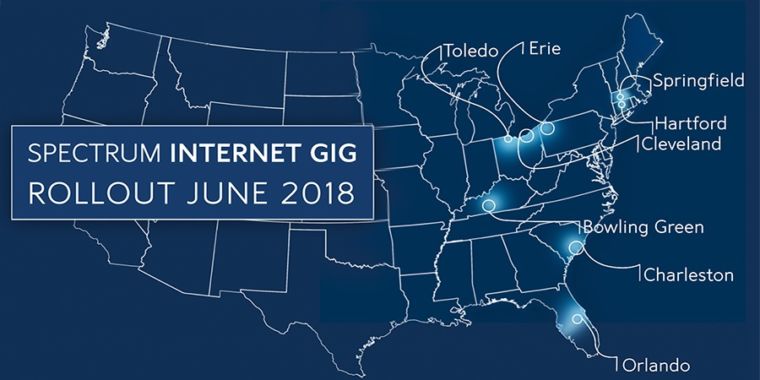
Charter
Charter’s gigabit Internet service launched to another 4 million homes this month, and now more than 27 million homes in Charter’s territory can get the ISP’s fastest offering. Charter is aiming to make the “Spectrum Internet Gig” service—with actual download speeds of up to 940Mbps—available to nearly all of the homes in its cable footprint by the end of this year.
The current 27 million home deployment is “more than halfway to our goal of making gigabit connections available to virtually our entire 41-state footprint,” Charter, the second largest US cable company after Comcast, said in an announcement last week. “By Labor Day, we’ll be rolling out to even more cities to get closer to that year-end goal.”
Charter’s cable network extends to about 50 million homes and businesses across the US. Prices for the gigabit service have ranged from $105 to $125 a month; DSLReports notes that the cost for consumers “var[ies] slightly depending on local competition.”
The 4 million homes that are newly eligible to buy gigabit service are in Toledo, Ohio; Cleveland, Ohio; Erie, Pennsylvania; Springfield, Massachusetts; Hartford, Connecticut; Bowling Green, Kentucky; Charleston, South Carolina; and Orlando, Florida.
The first markets to get the gigabit service earlier this year were Oahu, Hawaii; Austin, Texas; San Antonio, Texas, Charlotte, North Carolina; Cincinnati, Ohio; Kansas City, Missouri; New York City; and Raleigh-Durham, North Carolina. In April, Charter announced additional gigabit rollouts in parts of California, Texas, Nebraska, Wisconsin, Ohio, North Carolina, and New York.
Small and medium-sized businesses can now purchase Spectrum Business Internet Gig in any market where the gigabit offering is available to home customers. Charter already offered gigabit speeds to large businesses. Charter’s entry-level download speeds are 100Mbps, or 200Mbps in some markets.
940Mbps down, 35Mbps up
While Charter advertises the speed tier as a gigabit service, the actual maximum download speed is 940Mbps and uploads are just 35Mbps. It’s the same for Comcast, which notes that “Due to Ethernet overhead, actual download speeds are limited to 940Mbps over a hardwired connection.”
Comcast imposes data caps and overage fees on its cable Internet service, but Charter is prohibited from selling plans with data caps and overage fees until 2023 thanks to merger conditions imposed on its 2016 purchase of Time Warner Cable.
The near-gigabit download speeds are made possible by version 3.1 of DOCSIS, the industry’s Data Over Cable Service Interface Specification. Today’s gigabit cable offerings don’t support symmetrical download and upload speeds, though that could change after future updates to DOCSIS.
While Comcast offers 2Gbps download and upload speeds over its fiber-to-the-home service, Charter hasn’t rolled out all-fiber services to residences yet. Charter has said that it will eventually hit symmetrical gigabit speeds over its existing network, which includes plenty of fiber but relies on coaxial cable for the connection at each home.
Charter had 24.3 million Internet subscribers as of Q1 2018, behind only Comcast’s 26.2 million, according to Leichtman Research Group.
Disclosure: The Advance/Newhouse Partnership, which owns 13 percent of Charter, is part of Advance Publications. Advance Publications owns Condé Nast, which owns Ars Technica.
Be the first to comment